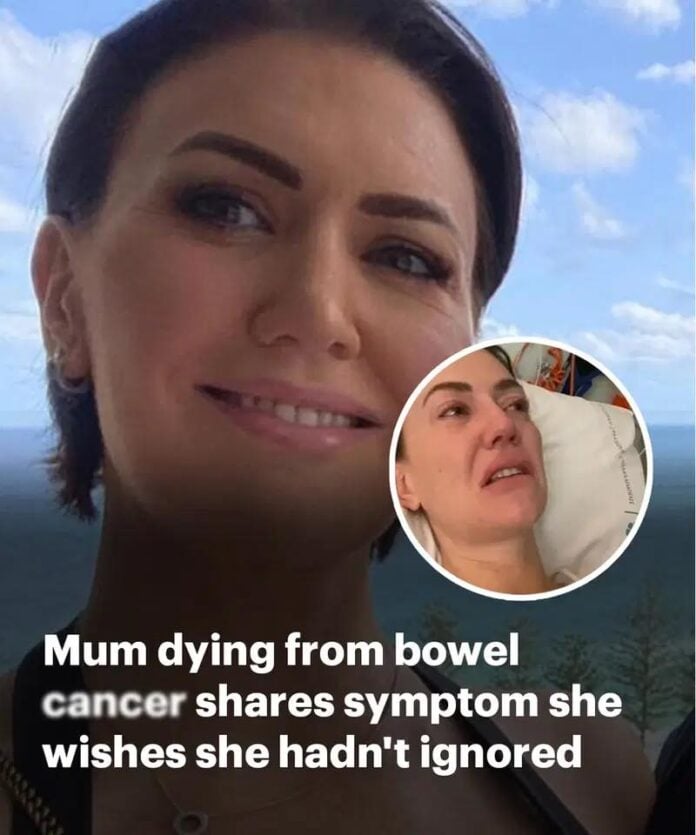A Life That Took an Unexpected Turn
At 39, Krystal Maeyke appeared to be the picture of health. She exercised regularly, ate well, and lived an active life as a devoted mother. To anyone who met her, she looked vibrant and strong. But beneath that healthy exterior, something silent and deadly was growing — and by the time she realized it, it was already too late.
In May 2023, Krystal’s life changed in an instant. What she had assumed were harmless stomach pains turned out to be stage four bowel cancer — a diagnosis that would ultimately claim her life.
Before she passed, Krystal shared her story publicly in the hope of warning others. She wanted people to pay attention to their bodies, to take persistent pain seriously, and to seek help early.
The Pain She Brushed Aside
For months before her diagnosis, Krystal had been experiencing sharp, stabbing pains in her abdomen. She assumed it was a food intolerance or perhaps something she had eaten that didn’t sit right.
“I thought it wasn’t anything serious,” she said. “That’s why it became advanced cancer and spread all through my abdomen, liver, and ovaries — starting from my bowel.”
At first, the pain came and went. But soon, it became unbearable.
She described the sensation as “stabbing pains that brought me to my knees.” Eventually, the pain became so intense that she had to be airlifted by ambulance to Alice Springs Hospital in Australia.
Even high doses of pain relief barely touched the agony. “Morphine did nothing,” she recalled. “Only fentanyl was able to dull it.”
When doctors finally ran scans, the results were devastating — the cancer had spread everywhere.
The Symptoms That Were Easy to Miss
Looking back, Krystal realized that her body had been warning her for months. The signs were there, but they seemed small, easy to overlook — especially for someone trying to balance work, motherhood, and daily life.
She listed several symptoms that, in hindsight, were early signs of bowel cancer:
- Persistent abdominal pain and cramping
- Unexplained fatigue, which she attributed to being a “busy mom”
- Irregular bowel movements that she thought were due to irritable bowel syndrome (IBS)
- Night sweats, which she blamed on the warm Australian weather
- Occasional bloating and discomfort after meals
None of these felt like a medical emergency at the time. But together, they painted a dangerous picture.
As Krystal later shared, “Never in a million years did I think that I would have something this cruel in my body. Cancer hurts — literally.”
A Mother’s Final Message
In her final months, Krystal used her remaining strength to speak openly about her experience. She wanted others to know how quickly things can change — and how vital early detection is.
She set up a GoFundMe page to help support her young son, Maison, and to raise awareness about the disease that took her life far too soon.
“I ignored the pain because I thought I was too young and too healthy,” she said. “Please, don’t do the same. Listen to your body. Don’t wait.”
Bowel Cancer: What to Watch For
While bowel cancer is often associated with older adults, doctors are seeing a concerning rise in younger, health-conscious individuals being diagnosed — people who exercise, eat well, and don’t fit the “typical” risk profile.
According to the NHS, common symptoms of bowel cancer can include:
- Ongoing changes in bowel habits, such as diarrhea or constipation
- Blood in the stool or bleeding from the rectum
- A constant feeling of needing to pass stool, even after going to the toilet
- Persistent abdominal pain, bloating, or cramping
- A noticeable lump or swelling in the abdomen
- Unexplained weight loss
- Fatigue or low energy for no clear reason
While these symptoms can sometimes have less serious causes, health experts stress the importance of getting them checked early. Delaying medical attention can make all the difference in treatment outcomes.
Why Early Detection Matters
Bowel cancer is one of the most treatable cancers when caught in its early stages. However, once it spreads beyond the bowel, treatment becomes much more difficult.
Doctors urge people — regardless of age — not to dismiss ongoing discomfort or changes in their health as “nothing serious.” Whether it’s fatigue, unusual pain, or subtle digestive changes, it’s always better to get tested and have peace of mind.
Krystal’s story serves as a heartbreaking but powerful reminder that good health on the outside doesn’t always mean good health within.
A Legacy of Awareness
Before her passing earlier this year, Krystal’s mission was clear: to help others avoid the same fate. She encouraged everyone to advocate for their own health, even when it feels uncomfortable to push for answers.
Her honesty continues to inspire families and individuals around the world to take symptoms seriously — to book that appointment, to ask that extra question, to trust that inner voice saying something isn’t right.
Her story is not one of defeat, but of courage — a reminder that awareness and vigilance can save lives.
If you or someone you love is experiencing ongoing symptoms such as unexplained abdominal pain, changes in bowel habits, or fatigue, don’t wait. See a doctor. Get screened. Trust your instincts.
Because sometimes, listening to your body is the most powerful thing you can do.



